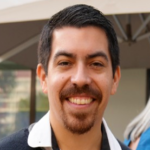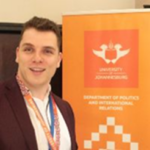Session Description
According to UNESCO, the number of people displaced due to natural disasters and extreme weather events jumped from 17.2 million in 2018 to 30.7 million in 2020. The number of people fleeing conflict, persecution, and violence exceeded 100 million in 2022. And while COVID-19 transformed the learning experience for millions, diseases such as Ebola had already tested the resilience of the education system in countries like Sierra Leone and Liberia; with further pandemics practically guaranteed due to climate change.
Complex emergencies have significantly disrupted education in the twenty-first century. Yet access to education is a fundamental right established by the Universal Declaration of Human Rights and a priority sustainable development goal for both the United Nations and UNESCO (SDG4: Quality Education for All). This panel aims to go beyond the experiences of the COVID-19 epidemic to examine and understand how educators and education systems have successfully weathered adverse teaching conditions such as conflict, disease, and disasters.
Digital technologies, such as online platforms and mobile apps, have provided some alternatives and often new means for students to access educational resources and continue their studies. They have also supported educators and sustained learning. However, there are severe limitations to their reach and impact, relying on infrastructure that can easily be disrupted by war and natural disasters. Furthermore, displaced and vulnerable populations have specific learning needs that may not be addressable digitally.
Bringing together educators experienced in teaching in extreme environments, this panel offers to address difficult questions on the opportunities and limits of digital technology, the needs of displaced students, and the coping mechanisms that educators have adopted to enable learning to continue against all odds.
Presenter(s)
 Caroline Varin
Caroline Varin
Tampere University of Applied Sciences
Luxembourg, Luxembourg
Caroline Varin holds a PhD in International Relations and an MSc in Comparative Politics from the London School of Economics, an LLM in International Law from the Universita di Bologna, Italy, and a BA in Political Science from the University of Pennsylvania. She has worked as a lecturer, a mentor and a tutor in Europe and the UK, the United States and in Central America. Caroline is passionate about education and finding new ways to upskill, stimulate and encourage students. Caroline has experience managing projects, organizing conferences and developing communication strategies for a variety of clients and sectors in Africa, the Middle East and Europe. She has also written a wide variety of articles on international security issues, has five books in print and regularly consults with governments and academic institutions. Caroline has lectured at Regent’s University London, Richmond University, and the London School of Economics among others.
 Oscar Boije
Oscar Boije
Tampere University of Applied Sciences
Finland
Oscar Boije is a Finnish-Bolivian education professional presently working for UNICEF Mozambique on Education in Emergencies programmes aimed at preparing for and recovering from the complex emergencies affecting the country, including the ongoing armed conflict, natural disasters, and public health crises. Previously Oscar has also worked for UNICEF in Somalia and Bangladesh, among others rolling out alternative and accelerated education programmes for out-of-school and other marginalised children. Prior to joining UNICEF, Oscar worked on youth and student exchanges and other non-formal education projects in various countries across Asia and Europe. Oscar has a master’s degree in human Rights Law from Lund University, Sweden, and a Bachelor and master’s degree in international public law from Åbo Akademi University, Finland. He is presently pursuing an MBA in Educational Leadership at Tampere University of Applied Sciences, Finland.
 Imrana Buba
Imrana Buba
Youth Initiative Against Terrorism
University of Oslo, Norway
Imrana Buba is the Founder of the Youth Initiative Against Terrorism, a youth-led organization working to unite youth against violent extremism in north-eastern Nigeria. Imrana has consulted for international organisations like USAID, ODI, Creative Associates International, International Alert and Mercy Corps as a youth engagement specialist, community development facilitator and conflict sensitivity expert. Imrana is a member of the European Union Youth Sounding Board, Mandela Washington Fellow, and Peace and Security Fellow of the AU-EU Youth Cooperation Hub. He received the 2016 Queen’s Young Leaders Award from Her Majesty Queen Elizabeth II and the 2017 JCI Ten Outstanding Young Persons of the World Award, in recognition of his efforts to counter violent extremism and promote a culture of peace in Nigeria. He holds BSc Political Science from the University of Maiduguri and MSc Africa and International Development from the University of Edinburgh, UK. He is a PhD Research Fellow at the University of Oslo, Norway.
 Dr Jon-Hans Coetzer
Dr Jon-Hans Coetzer
United Nations Institute for Training and Research (UNITAR)
Dr. Jon-Hans Coetzer contributes to the mission of the United Nations Institute for Training and Research (UNITAR). Jon-Hans creates high-value partnerships with different learning and educational institutions of higher education focusing on the areas of Peace, Security and Justice. Jon-Hans has more than 25 years of experience in both higher education and vocational training in more than 22 countries. Dr. Coetzer served as Chief Academic Officer of Glion Institute of Higher Education, Academic Dean of IHTTI, Neuchâtel, as Chief Academic Officer of the EU Business School Group. He has an established record of working with a variety of higher education partners including private and public universities in the United Kingdom and in the United States. His research interests focus on the cross-cultural challenge in the international classroom of management studies and changes in higher education. Jon-Hans passionately believes in the need to rethink education in order to contribute towards a more focused human-centered pedagogy suited to current opportunities and challenges.
 Sven Botha
Sven Botha
Thinktank Director
University of Johannesburg
Sven is an Assistant lecturer in Politics & International Relations at the University of Johannesburg. He holds a BSc in Political and International Studies from Monash University, a BA Hons in Politics and International Relations and MA in Politics, both awarded with Distinction from the University of Johannesburg. His areas of academic interest include foreign policy, terrorism, counter-terrorism and early-career development. He has published a wide range of work on international relations and early career development topics. Sven is also a member of the South African Association for Political Studies and the South African Institute of International Affairs.
